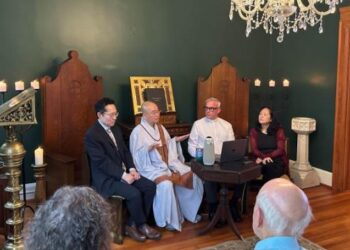Jun 11, 2025 – Day 4 of Washington D.C. Visit
Hello. Today, Sunim concluded his schedule in Washington D.C., rested at the Washington DC Jungto Center, and then departed for Korea.

Since President Trump’s inauguration last January, the U.S. administration has been undergoing major organizational restructuring across various departments. Today, Sunim was scheduled to visit the White House National Security Council (NSC) to discuss the resumption of U.S.-North Korea dialogue and improving relations. However, due to the recent resignation of the Asia-Pacific coordinator and no successor being appointed yet, the appointment was canceled. Additionally, since major issues were already discussed at the State Department yesterday, it was decided not to schedule any additional meetings.

After completing morning practice, Sunim had breakfast a bit later than usual. Although his throat condition had improved significantly, he still felt heavy and continued to rest after the meal.
At 3 p.m., after packing and preparing for departure, Sunim toured the grounds of the Washington DC Jungto Center with the resident volunteers, discussing the maintenance and construction plans for the center.
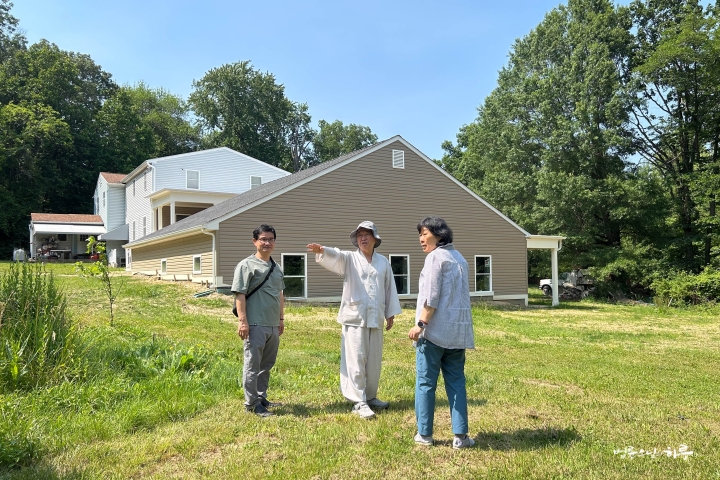
During the COVID pandemic, large trees had fallen due to storms, blocking the walking paths and making it difficult to enter the forest. Nevertheless, Sunim pushed through the bushes and personally inspected the entire property boundary.
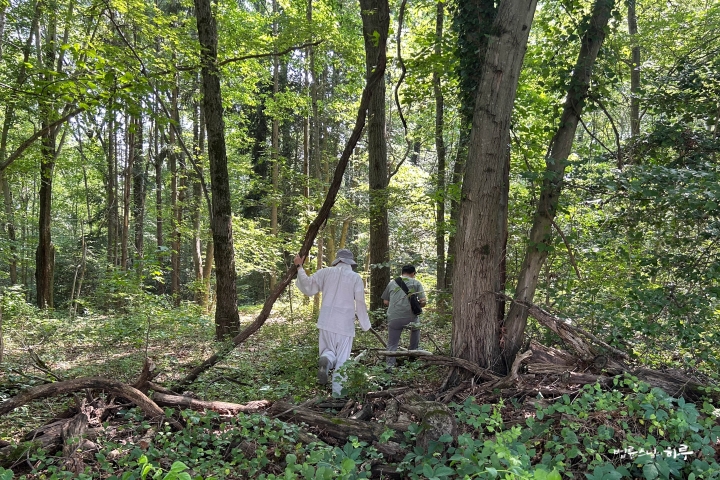
Along the way, Sunim identified various wild vegetables and plants that the volunteers were unfamiliar with.
“These are magnolia leaves used for wrapping rice cakes.”
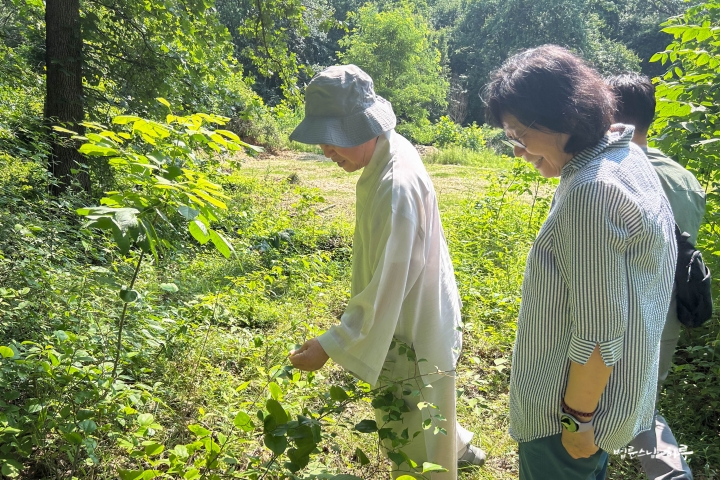

After touring the entire property, Sunim made suggestions.
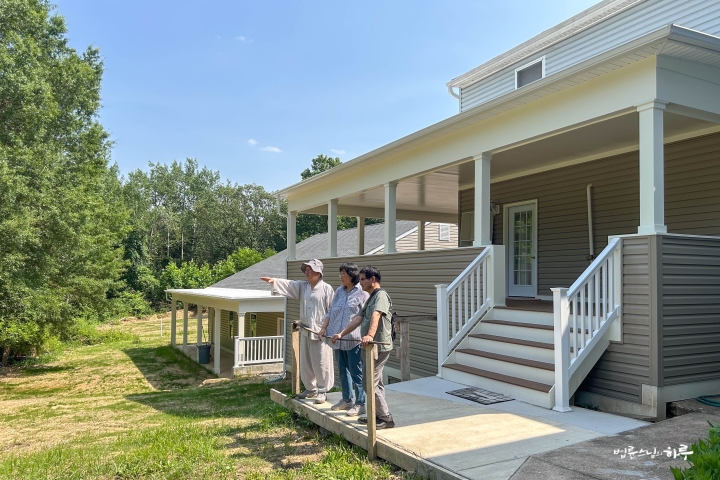
“Let’s maintain the fence along the boundary and place benches all around the perimeter. Create a space where members can come to listen to Dharma talks outdoors and rest. For seating the congregation, a flat area would be ideal. For the large tree in front of the new building, just trim the small branches and install a deck for resting. Since the terrain is generally sloped, if necessary, purchase an excavator to level the ground. Don’t overdo it – proceed slowly, one step at a time.”
Min Deok-hong, who is in charge of construction, responded that he would establish a five-year plan and proceed systematically.
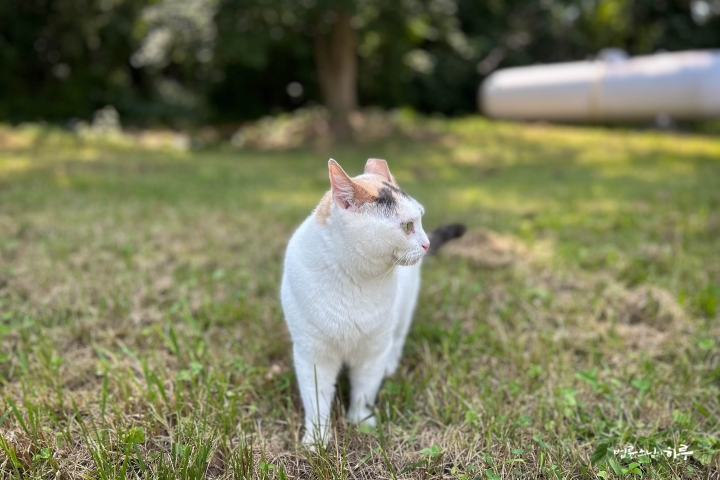
Before departing for the airport, Sunim bid farewell to the Washington volunteers in the Dharma hall. Despite his poor health, Sunim had done his best over the past three days to meet with people and engage in dialogue for peace on the Korean Peninsula, resumption of U.S.-North Korea dialogue, and humanitarian aid to North Korea. The volunteers offered three bows and said they would see him again when he returns to the United States at the end of August.
“Thank you all for your hard work. You’ve worked hard on the building construction. Take care of your health and practice diligently.”
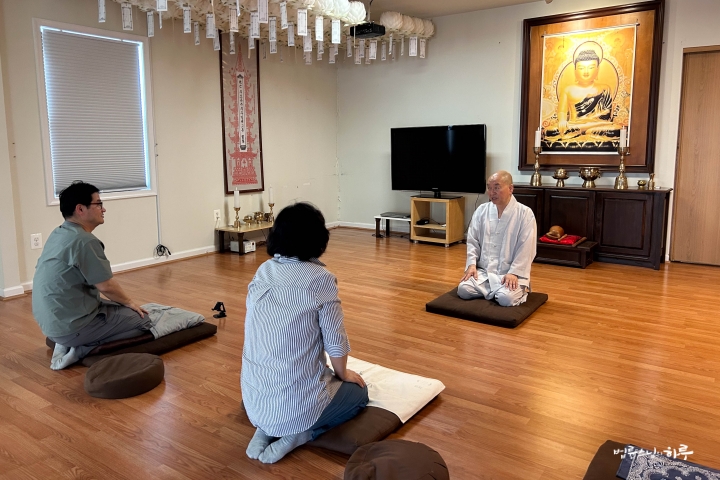
After exchanging greetings, Sunim immediately headed to Ronald Reagan Washington National Airport. Due to rush hour traffic, the journey took quite a long time. There was no time for a proper dinner, so he had a simple meal of fruit in the car.

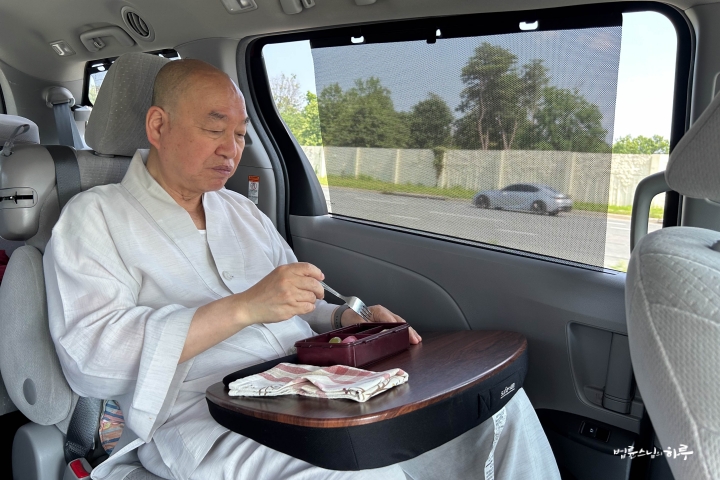
After arriving at the airport and completing departure procedures, Sunim departed for San Francisco on the 6:38 p.m. flight. As always, Sunim chose a more economical ticket over a direct flight. This time too, it was a long journey – flying six hours from Washington D.C. to San Francisco, then another 13 hours from San Francisco to Incheon.
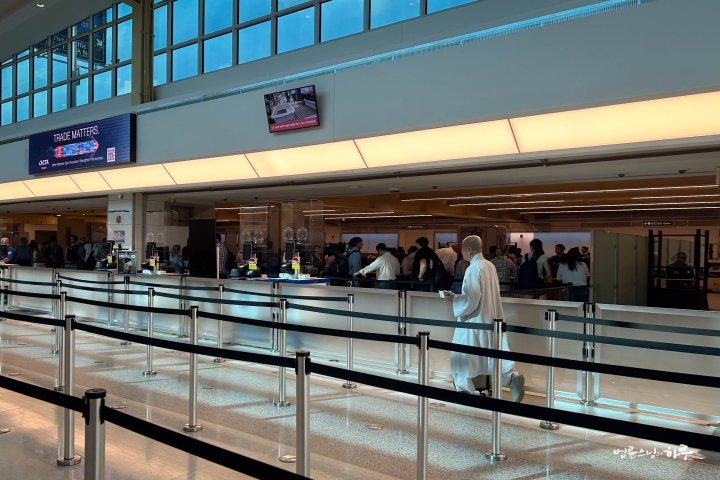
After arriving at San Francisco International Airport at 9:40 p.m. local time, Sunim spent 30 minutes transferring between terminals and boarded the flight to Korea at 11:30 p.m. Sunim ended his day by going to sleep in the sky.
Since there was no Dharma talk today, we’ll share a dialogue between Sunim and a questioner from the Weekly Dharma Assembly the day before yesterday.

Between My Husband’s Depression and My Daughter’s Disability, How Should I Live?
“Among depression patients, many cases lead to extreme choices when they don’t receive proper treatment or when they arbitrarily stop taking medication. That’s why unless a doctor says ‘You can stop taking the medication now,’ you should never stop on your own. Don’t ask ‘How long do I have to take this medication?’ – just think that you need to keep taking it. It’s the same with blood pressure medication. I also have to take heart medication until I die. Depression medication is not necessarily meant to completely cure the disease, but rather to prevent extreme situations that could arise from worsening symptoms. Right now, whether I take heart medication or not doesn’t make much difference. However, I take it consistently to prevent my heart from suddenly stopping or to prevent complications. Depression medication is exactly the same. The thought ‘Why should I take it when it doesn’t cure me even with medication?’ is wrong. You need to understand that the purpose of taking medication is to prevent extreme incidents that could happen even once or twice a year.”
“You shouldn’t worry about ‘Should I divorce my husband or not?’ right now. Instead, you should give your husband confidence by saying, ‘If you take your medication consistently and your life stabilizes, I will continue to live with you.’ This is because your husband is always anxious that his wife might leave because of his illness, and this psychological anxiety can worsen his symptoms. So it’s important to reassure your husband and encourage him to take his medication consistently.”
“It would be good for your child to receive hospital treatment as well. Of course, if your husband doesn’t usually have major episodes, you could observe, but if he’s in a state where such incidents could happen even once or twice a year, it’s important for your child to maintain good mental health. If the child is mentally healthy, such incidents can pass lightly, but if their condition is poor, it could worsen. So if possible, it would be good for your child to receive consistent treatment while taking medication.”
“You need to view your husband not as a normal person but as a patient. Only then will you not hate or be shocked by your husband’s behavior. Just as you go to the hospital for treatment when you break a leg, when you see your husband’s abnormal behavior, you should think, ‘His illness has flared up, so he needs to go to the hospital for treatment.’ And you should pray with gratitude, saying ‘Thank you, Buddha. I’m grateful it’s only this bad.’ This will help.”
“Yes, Sunim. I’m also trying continuously to recognize that my husband is a patient, but it’s really difficult.”
“That’s right. Mental illness is especially difficult to understand. When someone has a broken arm, can’t see, or is in a wheelchair with a broken leg, the illness is visible, so it’s easy to accept that ‘This person is a patient!’ But mental illness looks normal on the outside. So it’s easy to think, ‘If they just pulled themselves together a bit, they’d be fine. Why are they like that?’ That’s why it’s actually more difficult to deal with someone with mental illness than physical illness.”
“You must always maintain the perspective that ‘My husband is a patient. My child is also a patient.’ Because they are patients, they can occasionally have episodes, and when they do, you need to think that you must quickly take them to the hospital. You shouldn’t try to fight or make an issue of a patient being sick. When symptoms appear, you need to quickly take them to the hospital to calm them down.”
“Yes, I understand. Thank you.”
“You yourself must also practice consistently. While doing 108 prostrations daily, you should pray with gratitude, saying ‘I’m grateful it’s only this bad. Thank you, Buddha.’ Only then can you avoid becoming ill yourself. Otherwise, you could be swept up in the situation and become ill too. If all three family members become ill, who will take care of you? Since the family can only be maintained if at least one person is healthy, you must pray consistently.”
“Sunim, if I practice consistently, will there be no problem with my mental health?”
“If you feel mental difficulties, it would be good to go to the hospital for an examination. Living with patients can unconsciously affect you and cause illness. Just as you can catch a cold from living with someone who has one, living with mentally ill patients for a long time can affect you mentally. In fact, psychiatrists have a higher rate of mental illness than the general population. This is because they are affected by dealing with patients for a long time. That’s why psychiatrists also regularly receive counseling from other psychiatrists. Similarly, you should receive regular medical care and practice consistently.”
“Thank you. I’m grateful for your warm and wise words that I couldn’t even hear from my parents. I’ll first take care of my own health and try to return to normal daily life rather than considering divorce. Listening to your words and reflecting, I realize it was really difficult for me to recognize my husband as a patient. I couldn’t distinguish between when my husband seemed relatively normal and when his illness flared up, and I always wished he could be normal.”
“Then would it be better if your husband were constantly in a patient state? Or would it be better if he’s a patient but mostly fine, with episodes only a few times a year?”
“I’ve lived with my husband for about 10 years, and during that time, serious episodes happened only once or twice. Light episodes seemed to occur once every two to three years.”
“That’s bearable. Think of your husband’s illness as having episodes about once a year, and each time, just go to the hospital immediately for treatment.”
“Yes, I understand.”
“Would you like your husband to have episodes every day? If he had episodes daily, you’d never forget that your husband is a patient.” (laughter)
“His perspective keeps narrowing, and his vocabulary is so limited that conversation is difficult.”
“Just think of it as a foreign language. The language learned in childhood becomes a person’s native language. If someone grew up hearing only profanity, they would only speak in ways that sound like profanity. While it might feel harsh to the listener, it’s not cursing – it’s just their language. For example, when people from Gyeongsang Province speak normally, it might sound like rude speech or arguing to people from Seoul. Their speech patterns sound a bit rough. But they’re not actually trying to speak rudely or fight. It’s just their normal way of speaking. Similarly, when listening to your husband’s words, if you accept them thinking ‘That’s his native language,’ ‘That’s just how he speaks,’ it will become much easier.”
“Yes, I understand. Thank you.”
Tomorrow, after a 13-hour flight, Sunim will arrive at Incheon Airport at 4:30 a.m. Korean time, spend the entire day meeting with visitors at The Peace Foundation, conduct the Friday Dharma Q&A live broadcast in the evening, and then travel to Dubuk Jungto Retreat Center.




